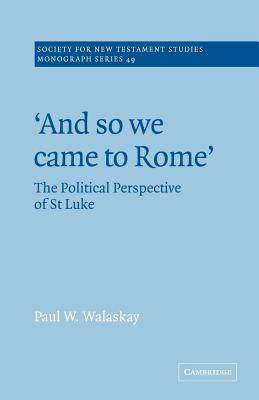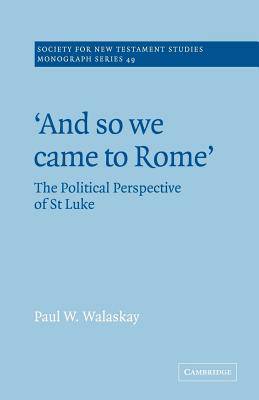
- Afhalen na 1 uur in een winkel met voorraad
- Gratis thuislevering in België vanaf € 30
- Ruim aanbod met 7 miljoen producten
- Afhalen na 1 uur in een winkel met voorraad
- Gratis thuislevering in België vanaf € 30
- Ruim aanbod met 7 miljoen producten
Zoeken
Omschrijving
It has often been suggested that Luke's two volumes were written as an apology for Christianity, to demonstrate to the Roman authorities that the new faith was not a dangerous and subversive innovation, a threat to the Pax Romana and to Roman rule. This book reviews the development of the 'traditional perspective', then raises some questions, e.g. if Luke was writing an apologia pro ecclesia, why does he include so much material politically damaging to the Christian cause? Is it possible that the approach has been made from the wrong angle, that Luke was writing an apologia not pro ecclesia but pro imperio, to assure his fellow Christians that Church and Empire need not fear or suspect each other? This conclusion is then supported by an investigation of the text of Luke-Acts, particularly the trials of Jesus and Paul. This challenging volume will be of interest to students and scholars of the New Testament and to ecclesiastical and Roman historians.
Specificaties
Betrokkenen
- Auteur(s):
- Uitgeverij:
Inhoud
- Aantal bladzijden:
- 136
- Taal:
- Engels
- Reeks:
- Reeksnummer:
- nr. 49
Eigenschappen
- Productcode (EAN):
- 9780521020565
- Verschijningsdatum:
- 6/10/2005
- Uitvoering:
- Paperback
- Formaat:
- Trade paperback (VS)
- Afmetingen:
- 140 mm x 216 mm
- Gewicht:
- 181 g

Alleen bij Standaard Boekhandel
+ 121 punten op je klantenkaart van Standaard Boekhandel
Beoordelingen
We publiceren alleen reviews die voldoen aan de voorwaarden voor reviews. Bekijk onze voorwaarden voor reviews.











